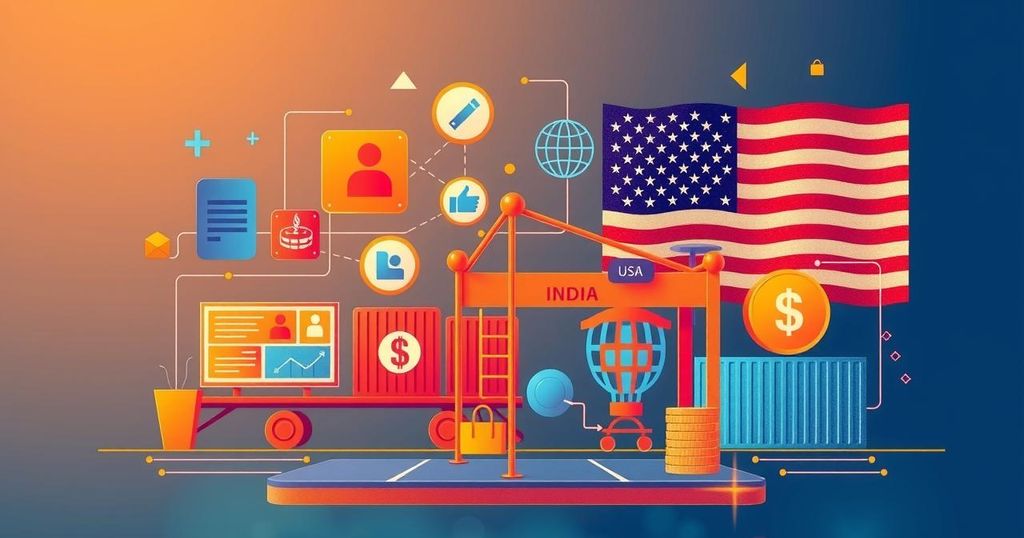The DRC has announced a four-month export ban on cobalt, crucial for electronics and electric vehicles. This move aims to address oversupply issues and could raise prices, impacting global markets. China is particularly vulnerable, while other nations seek alternatives. Enforcement challenges persist amid geographical complexities, but regulatory measures are in place to improve mining practices.
The Democratic Republic of Congo (DRC), recognized as the world’s foremost producer of cobalt, has announced a four-month ban on the exportation of this critical metal. Cobalt, a by-product of nickel and copper mining, is essential for the production of rechargeable lithium-ion batteries, commonly utilized in electronics such as smartphones and electric vehicles. By controlling over 70% of global cobalt production, the DRC plays a significant role in the supply chain for these industries.
The DRC’s decision to halt cobalt exports is a strategic response to address the oversupply situation that has been causing a decline in cobalt prices. From a peak of $82,000 per metric ton in April 2022, prices had plummeted to $21,000 per metric ton by February 2025. This initiative is expected to elevate cobalt prices once again, influencing various industrial sectors reliant on this element. “Any problem for cobalt supply go affect many industries, especially consumer electronics,” stated Anita Mensah, a commodities analyst for Global Trade Insights.
Industries dependent on cobalt have already experienced disruptions as a result of the announcement. Products like smartphones, laptops, and electric vehicles, all powered by lithium-ion batteries, may face rising costs due to the DRC’s export halt. Supply chain experts, including Peter Zhang, have noted that suppliers are already adjusting prices in anticipation of future increases. If the ban persists for more than three months, consumers could experience higher prices or modifications in battery performance, as highlighted by Zhang.
The suspension has also led to fluctuations in cobalt futures prices, with significant spikes noted. David Okoro, a metals trader, reported that cobalt futures prices hit an upper limit during overnight trading, suggesting volatility in the market. Nevertheless, some experts view the potential price increase as a short-term issue, referencing historical oversupply scenarios, such as the 2019 shutdown at the Mutanda mine.
China, heavily reliant on Congolese cobalt, is expected to face the most significant repercussions from the export ban. In contrast, countries such as the United States, Japan, and others are actively diversifying their supply chains and seeking alternative materials for battery production. A prolonged ban may result in higher prices for premium electronic devices, extended wait times for electric vehicles, and increased exploration of alternative battery technologies.
To enforce the export ban, DRC authorities are implementing strict measures to ensure compliance among mining companies. Agencies such as the Direction Générale des Douanes et Accises and the Direction Générale des Migrations are tasked with monitoring export activities. Patrick Luabeya, President of the Authority for the Regulation and Control of Strategic Mineral Substances’ Markets, noted that these measures aim to regulate the excess supply in the international market.
However, enforcing the ban poses challenges, especially given the geographic and infrastructural complexities of the DRC’s mining regions, which border Zambia and Angola. Smuggling attempts may be facilitated by the extensive and largely unmonitored borders. The government is also tightening mining regulations, mandating that artisanal cobalt be sold through a state-controlled entity, and is addressing labor concerns associated with cobalt mining, including banning child labor and promoting safe working conditions.
The Democratic Republic of Congo’s decision to impose a four-month export ban on cobalt is set to impact prices in the consumer electronics and electric vehicle markets significantly. While the export halt may lead to an increase in cobalt prices as industries adjust, the long-term effects remain uncertain, influenced by geopolitical factors and alternative supply efforts. Enforcing the ban presents logistical challenges, and the government’s actions toward regulatory improvements in mining practices will be crucial for a sustainable approach moving forward.
Original Source: www.bbc.com




